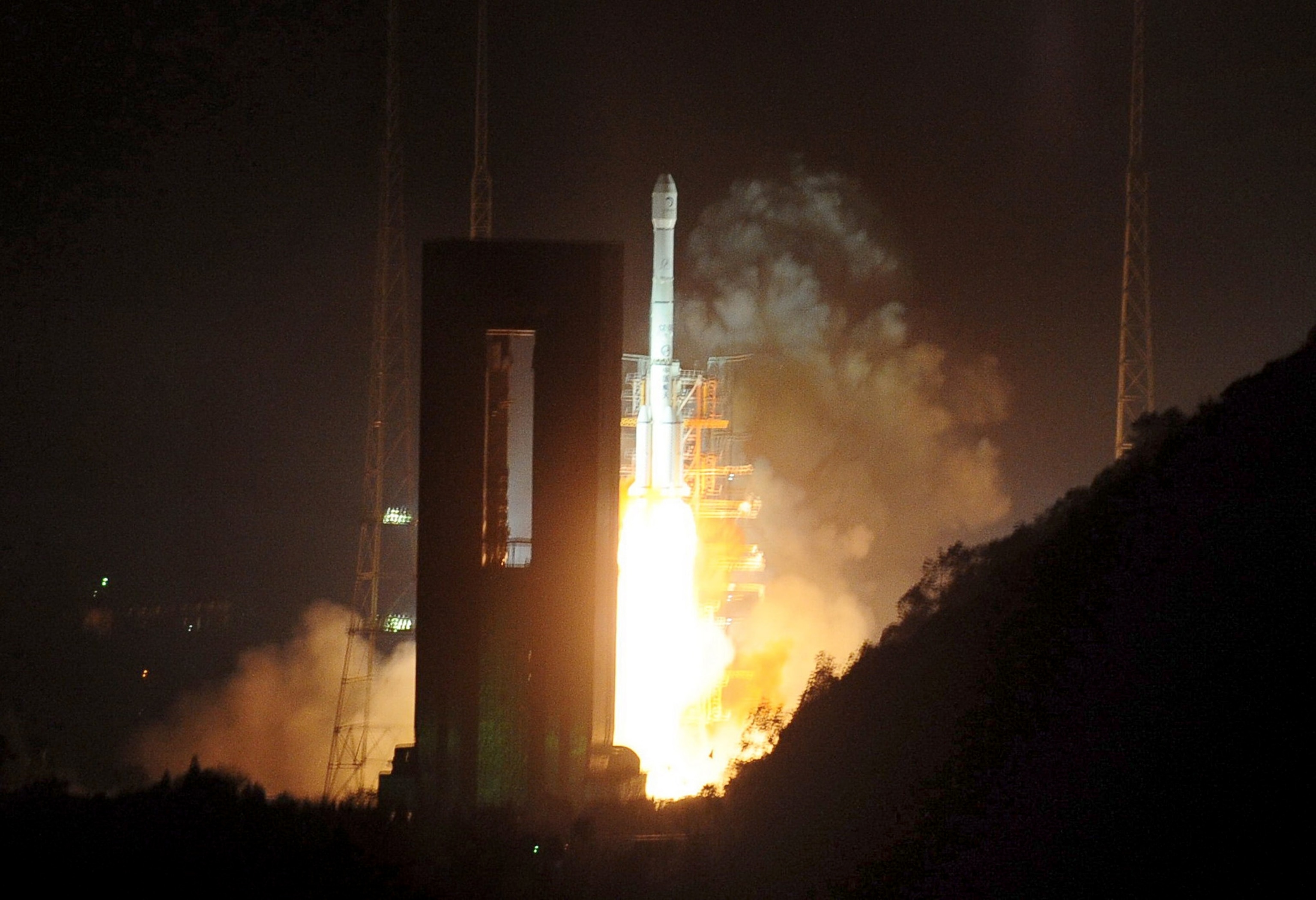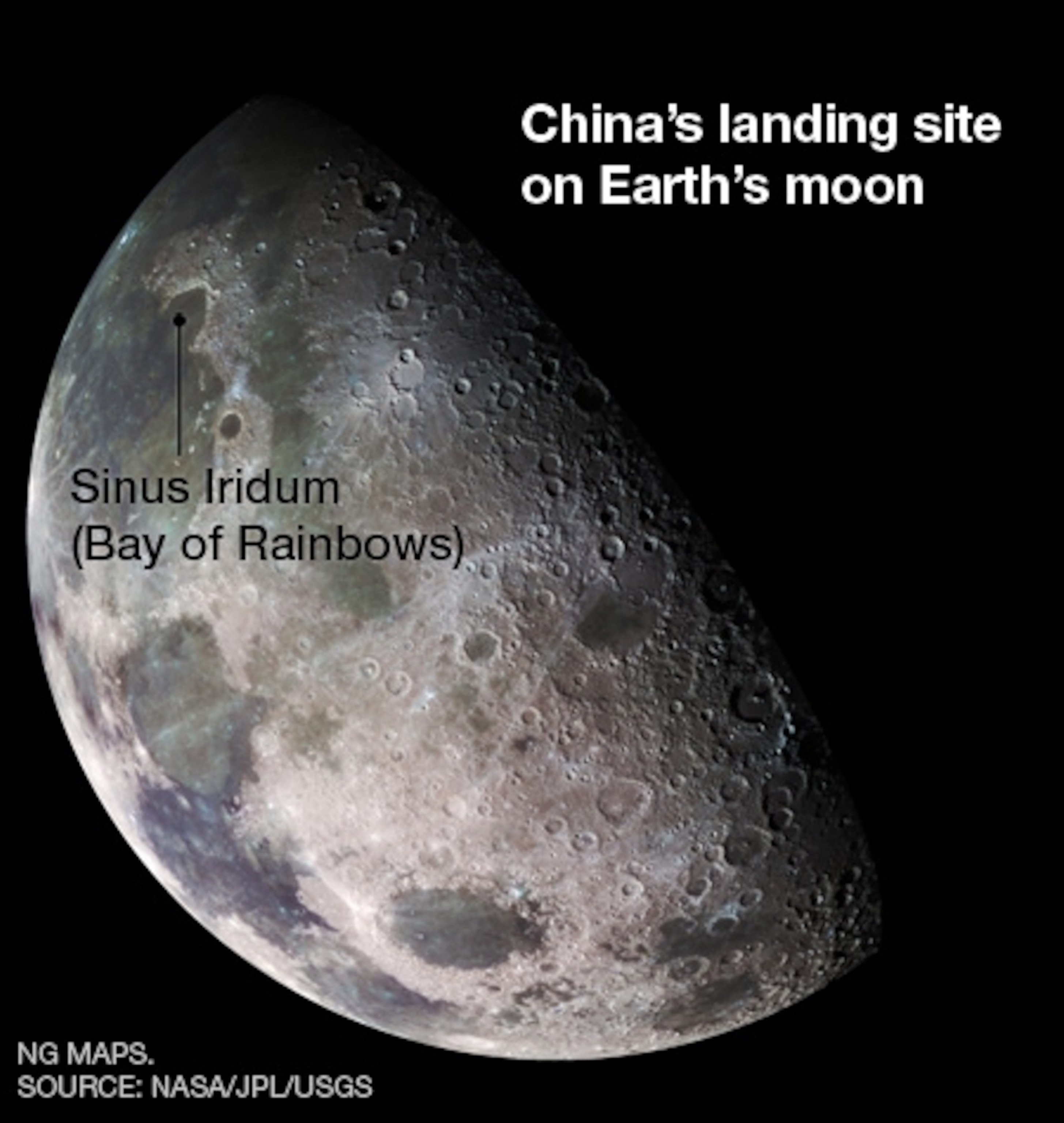
China’s Moon Rover Raises Questions Over Long Halt in Lunar Landings
A lack of political and scientific interest explains the long interlude, which is broken by a fresh moon race.
A dry spell lasting 37 years for “soft” lunar landings ended on Saturday, December 14, with the arrival of China’s lunar rover.
Launched December 1, the Yutu, or Jade Rabbit, rover will take pictures, probe the lunar surface, and install two telescopes on the moon.
With a successful rocket-assisted soft landing, the 220-pound (100-kilogram) rover will also make China only the third nation, besides the U.S.A. and Russia, to stage a slow landing of a spacecraft on the moon. (See also: “China Shoots for the Moon.”)
The last such lunar landing took place with Russia’s Luna 24 mission in 1976, which returned moon rocks to Earth. Apollo 17 in 1972, the most recent manned mission to the moon, was the final U.S. soft lunar landing.

Why haven’t Russian or U.S. landers returned to the moon, and why the long wait for this latest lander?
“The short answer is that there was no compelling scientific reason to go back to the moon,” says space policy expert John Logsdon, author of John F. Kennedy and His Race to the Moon. “And probably still isn’t.”
NASA’s Apollo missions after all returned 842 hundred pounds (382 kilograms) of moon rocks to Earth, some of them still unexamined. They answered questions about the age of the moon, now thought to have arisen from an early collision between the Earth and a Mars-size object roughly 4.5 billion years ago.
Those missions also pointed to the moon as an expensive and dangerous place to send people, particularly after the near-fatal Apollo 13 mission in 1970, which spooked U.S. President Richard Nixon, who was already looking for ways to rein in space agency spending after his 1972 re-election, according to Logsdon.
China’s Lunar Goals
“Firstly, the moon is remote from us, and there is no clear short-term benefit for human beings,” says space scientist Yongchun Zheng of the National Astronomical Observatories in Beijing, by email.
But for China, he says, “the lunar exploration program is driven by its science goals. That is, to understand the history and prospect the future of the Moon, the Earth, and our solar system.”
In a 2008 report in the Planetary and Space Science journal, Zheng and colleagues also noted that “lunar exploration may promote the innovation and development of series of basic and applied science” for China.
“The implementation of China’s Lunar Exploration Program can drive forward the popularization, improve accomplishment of national science, and attract and encourage the youth to fall in love with science and seek after exploration and innovation,” they wrote.
On a more down-to-earth level, “China’s space program provides several key benefits to the nation,” space policy analyst Patrick Besha wrote in a 2010 Space Policy report on China’s lunar program. Primarily, he wrote, “it expands the high-technology sector and helps to integrate key military and technology industries.”
Legend of Chang'e Flying to the Moon
In Chinese legend, Chang'e was a beautiful woman who swallowed an elixir of immortality and found herself becoming lighter and lighter.
“She flew up in spite of herself, drifting and floating in the air, until she reached the palace of the moon,” according to the Planetary and Space Science report. “Once on the moon, Chang'e became a three-legged toad, as punishment,” it notes.
Despite the unhappy ending, the legend of the moon goddess still serves as inspiration for China, according to the report.
China’s rover landing is the culmination of a lunar program initiated more than a decade ago, which has seen two previous spacecraft successfully enter lunar orbit, one in 2007 and one in 2010.
Over the past decade, China’s space program has also launched “taikonauts” to an orbiting space lab, re-creating space technology steps undertaken by the U.S. and Russian space agencies four decades ago.
“The logical culmination of these efforts would be a well-deliberated attempt to land people on the moon at some point,” says former NASA official Scott Pace of the George Washington University in Washington, D.C.
The New Moon Race
China’s lunar rover comes after a decade of renewed attention paid to the moon by the world’s space agencies. The arrival of the U.S. Air Force/NASA Clementine mission to the moon in 1994 sparked much of the recent interest in the lunar surface after it reported signs of water frozen there in a radar experiment.
In 2010, NASA’s LCROSS mission showed by means of two “hard” landings—deliberate impacts of the spacecraft and a companion rocket that threw up a plume of dust—that the moon hid frozen water deep in the permanently shaded craters on its south pole.
The finding has figured in debates over the next step for the U.S. manned space program, with a U.S.-Canadian moon rover called RESOLVE considered as a lunar water prospector for future missions. Some space entrepreneurs, such as Robert Bigelow of Bigelow Aerospace, have called for awarding mineral rights to spur moon colonies. (See also: “Moon Mining Rush Ahead.”)
There are also more than a dozen private teams competing for the $40 million Google Lunar XPRIZE, which will be awarded for landing a rover and driving it “above, below, or on the Lunar surface” some 1,640 feet (500 meters) by 2015.
China’s Jade Rabbit rover looks set to beat the Lunar XPRIZE teams, at least, with its landing.
“The moon is a challenging goal for rising space powers and private-sector players but a reachable goal, so it’s the logical next step beyond low Earth orbit," Pace says.
“Orbiting the moon is much easier than executing a soft landing, much less controlling a rover on the surface,” he adds, which goes a long way toward explaining why we have had to wait so long for this latest lunar rover.